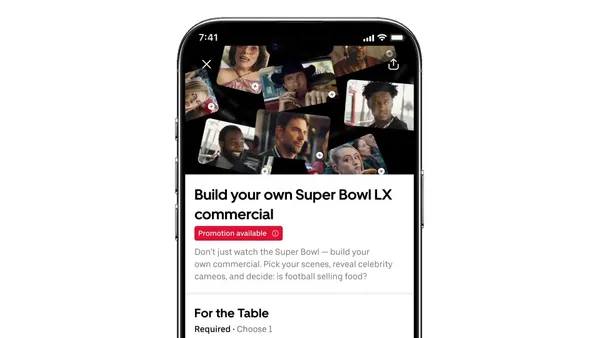Brief:
- Apple plans to expand its digital advertising business as the tech giant shifts its growth strategy to include not only selling devices like the iPhone but also using them to market services, unnamed sources told The Wall Street Journal. Over the last year Apple has met with companies, including Snap and Pinterest, about participating in a network that would place ads across their collective apps.
- It's unclear when the company may start the ad network, though Apple plans to share revenue with participating apps with the split varying from app to app. The system would mean that users who search in Pinterest's app for "drapes" might see an Apple-pushed ad for an interior-design app, or Snapchat users entering "NFL" as a search term might see an ad for a ticket-reseller app, for example.
- Apple's last attempt to start an advertising business was a bust. The company started iAd in 2010 to sell ads within mobile apps on iPhones and iPads, but its high prices and restrictions on the types of ads didn't appeal to marketers. Apple shut iAd in 2016 to focus on the App Store ad business.
Insight:
Faced with slowing growth for its mobile devices, Apple is beginning to focus on its services side — the App Store, Apple Music, iCloud storage and Apple Pay — and getting back into the ad business. Apple's business of selling promotional ads for search terms in its App Store delivered nearly $1 billion in revenue last year, the Journal reported.
Apple generally has shied away from businesses that require sharing more data about its customers, but it may need to shift in a competitive market against ad giants Google and Facebook, who can deliver marketers some kind of assurance that their ads are reaching target audiences. If done well, the company could capitalize on the fact that mobile commerce is booming as advertisers ramp up spending in that space.
Currently for App Store ads, Apple gathers data such as name, address, age, gender, device use, app activity and music, video or book downloads. The company compiles the demographic information to create group profiles — called segments — for targeted ads. Apple doesn't collect personal data from Maps or its voice-enabled Siri digital assistant to use for advertising, limiting the amount of personal user information the company can leverage.
Meanwhile, the "duopoly" Facebook and Google dominate digital advertising with a combined 60% market share, according to eMarketer. Apple's possible move into advertising comes as Google is elbowing into the hardware market with the 2016 launch of the Pixel smartphone to compete with the iPhone. At the same time, Facebook has plans to get into the hardware market with a smart speaker that would rival Apple's HomePod, Google Home and Amazon's suite of Alexa-powered Echo speakers.













